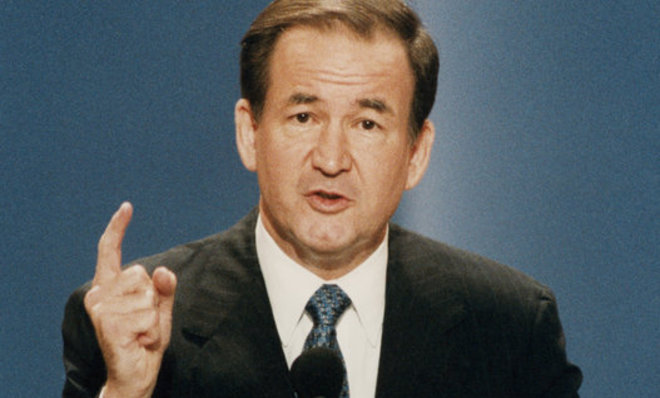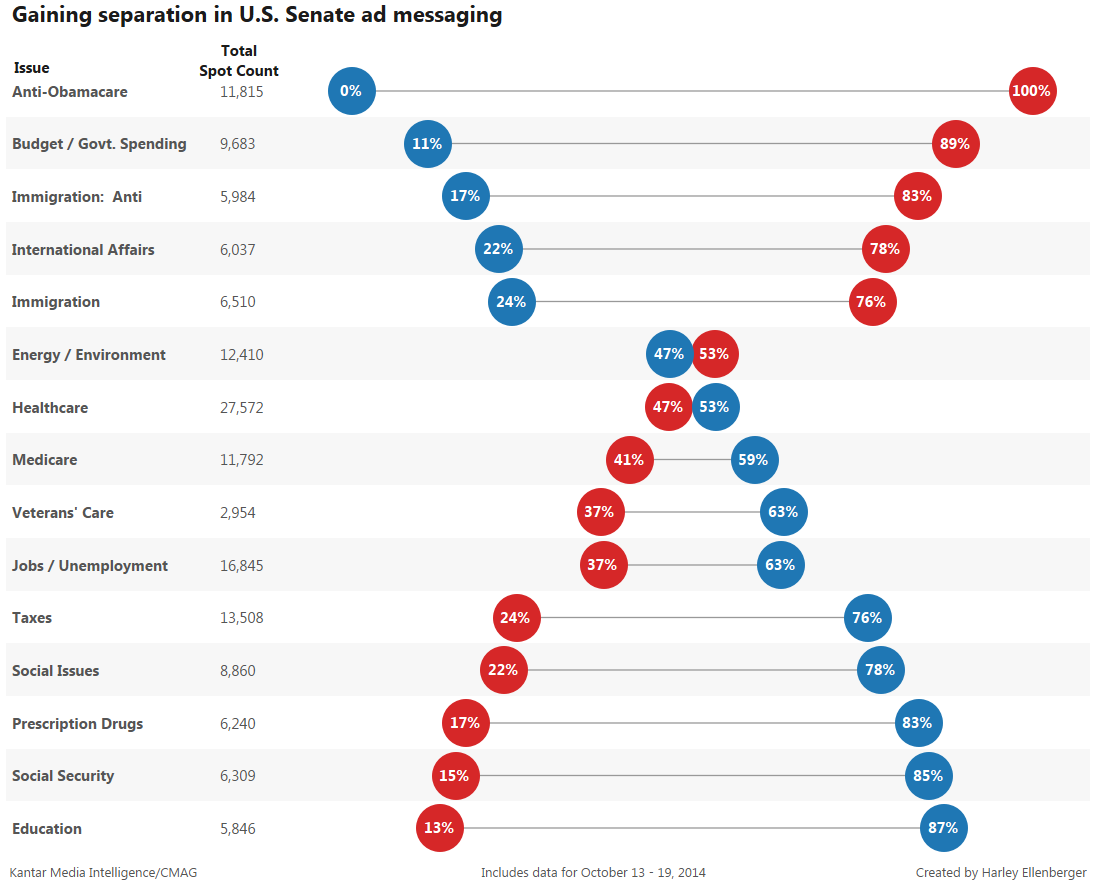Election 2014: Maybe America's 'culture war' really has ended
Pat Buchanan declared war on the Clinton agenda in 1992. Decades later, the Clintons are faring much better than Buchanan's "cultural war."


A free daily email with the biggest news stories of the day – and the best features from TheWeek.com
You are now subscribed
Your newsletter sign-up was successful
There are a lot of depressing things about Election Day 2014, regardless of whom you are voting for and how they fare. Chief among them is that parties and candidates spent at least $4 billion — making this by far the most expensive midterm election yet — and all that cash didn't buy much but fear, loathing, and apathy. Still, there may be one silver lining: the deafening silence on the "culture war" front.
Americans have always had their cultural differences with one another, but the Great Culture War probably started in the ashes of the 1960s social and sexual revolutions, with the rise of the Moral Majority in the late 1970s and all its early bêtes noires, most famously early-1980s Madonna and fictional TV newswoman and single mother Murphy Brown.
Pat Buchanan formally declared a "cultural war" at the 1992 Republican National Convention, listing as the threats to "the soul of America" a handful of hot-button religious and social issues: "abortion on demand, a litmus test for the Supreme Court, homosexual rights, discrimination against religious schools, women in combat units." A year earlier, University of Virginia sociologist James Davison Hunter had identified similar conflicts in his book Culture Wars: The Struggle to Define America.
The Week
Escape your echo chamber. Get the facts behind the news, plus analysis from multiple perspectives.

Sign up for The Week's Free Newsletters
From our morning news briefing to a weekly Good News Newsletter, get the best of The Week delivered directly to your inbox.
From our morning news briefing to a weekly Good News Newsletter, get the best of The Week delivered directly to your inbox.
Bill Scher at Politico Magazine dates the beginning of the culture war to Buchanan's speech — and adds this epitaph: "On Oct. 6, 2014, Republicans surrendered." That date is when the U.S. Supreme Court allowed gay marriage to flower in a large number of states, and the Republican silence was so notable that former GOP presidential candidate and Arkansas Gov. Mike Huckabee accused his party of abdicating on same-sex marriage, decried its lack of "guts," and threatened to "become an independent."
I don't think the terms of the truce are so clear-cut — "culture war" Republicans are clearly losing on same-sex marriage, women and gays in the military, and birth control, but they are winning on gun control and have made large strides toward restricting access to abortion.
The thing is, almost no candidates are talking about those issues this year.
Former culture-warrior Republicans in close Senate and gubernatorial races — Thom Tillis in North Carolina, Joni Ernst in Iowa, Cory Gardner in Colorado, and Gov. Scott Walker in Wisconsin, for example — have downplayed or disavowed their previous support for things like "personhood amendments," a priority of the religious right, and have aired ads in favor of over-the-counter contraception. Some GOP Senate candidates have come out in favor of gay marriage.
A free daily email with the biggest news stories of the day – and the best features from TheWeek.com
Voters don't seem to care much — the economy, terrorism and ISIS, Ebola, and pocketbook issues matter much more to voters than cultural and social issues — and the ad spending reflects that, as graphed out by CMAG and Kantor Media Intelligence. (The total number of ads aired on a topic is on the left, and the dots show the percentage of those ads from each party.)

Republicans no longer want to talk about "culture war" issues — they mostly want to talk about President Obama, ObamaCare, and the twin threats of Ebola and the Islamic State of Iraq and Syria. Democrats have tried to pick up the slack with ads on reproductive rights, but voters rank abortion and birth control pretty low, and there's little sign their "reverse culture war," as The Guardian's Ed Pilkington puts it, is very effective.
"Change or die has become the motto of the Republicans," explains GOP messaging guru Frank Luntz. "It's three strikes and you're out — and after 2010 and 2012, when seats were lost by candidates who focused too much on social conservatism, the Republicans weren't going to make the same mistake again."
If Republicans are running away from hot-button social issues in a midterm election that's so favorable to the GOP, that's a pretty good time to call time of death for the "culture war." There will be other fights over cultural issues — there always are, and that's probably for the best — but this particularly acrimonious and divisive three-decade-long war appears to be over. And that may be the best news you get all Election Day.
Peter has worked as a news and culture writer and editor at The Week since the site's launch in 2008. He covers politics, world affairs, religion and cultural currents. His journalism career began as a copy editor at a financial newswire and has included editorial positions at The New York Times Magazine, Facts on File, and Oregon State University.
-
 Quentin Deranque: a student’s death energizes the French far right
Quentin Deranque: a student’s death energizes the French far rightIN THE SPOTLIGHT Reactions to the violent killing of an ultra-conservative activist offer a glimpse at the culture wars roiling France ahead of next year’s elections.
-
 Secured vs. unsecured loans: how do they differ and which is better?
Secured vs. unsecured loans: how do they differ and which is better?the explainer They are distinguished by the level of risk and the inclusion of collateral
-
 ‘States that set ambitious climate targets are already feeling the tension’
‘States that set ambitious climate targets are already feeling the tension’Instant Opinion Opinion, comment and editorials of the day
-
 The billionaires’ wealth tax: a catastrophe for California?
The billionaires’ wealth tax: a catastrophe for California?Talking Point Peter Thiel and Larry Page preparing to change state residency
-
 Bari Weiss’ ‘60 Minutes’ scandal is about more than one report
Bari Weiss’ ‘60 Minutes’ scandal is about more than one reportIN THE SPOTLIGHT By blocking an approved segment on a controversial prison holding US deportees in El Salvador, the editor-in-chief of CBS News has become the main story
-
 Has Zohran Mamdani shown the Democrats how to win again?
Has Zohran Mamdani shown the Democrats how to win again?Today’s Big Question New York City mayoral election touted as victory for left-wing populists but moderate centrist wins elsewhere present more complex path for Democratic Party
-
 Millions turn out for anti-Trump ‘No Kings’ rallies
Millions turn out for anti-Trump ‘No Kings’ ralliesSpeed Read An estimated 7 million people participated, 2 million more than at the first ‘No Kings’ protest in June
-
 Ghislaine Maxwell: angling for a Trump pardon
Ghislaine Maxwell: angling for a Trump pardonTalking Point Convicted sex trafficker's testimony could shed new light on president's links to Jeffrey Epstein
-
 The last words and final moments of 40 presidents
The last words and final moments of 40 presidentsThe Explainer Some are eloquent quotes worthy of the holders of the highest office in the nation, and others... aren't
-
 The JFK files: the truth at last?
The JFK files: the truth at last?In The Spotlight More than 64,000 previously classified documents relating the 1963 assassination of John F. Kennedy have been released by the Trump administration
-
 'Seriously, not literally': how should the world take Donald Trump?
'Seriously, not literally': how should the world take Donald Trump?Today's big question White House rhetoric and reality look likely to become increasingly blurred
